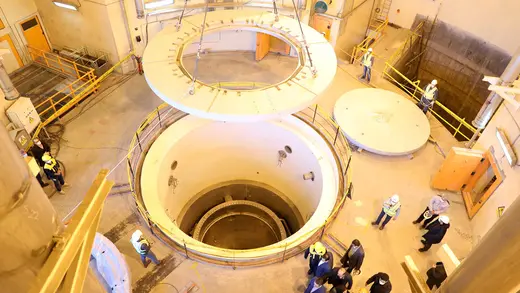The Coming Nuclear Crisis With Iran
Iran’s move to suspend cooperation with the 2015 nuclear deal threatens to further escalate already high tensions between Washington and Tehran.
By experts and staff
- Published
By
- Philip H. GordonMary and David Boies Senior Fellow in U.S. Foreign Policy
What does Iran’s announcement mean? Is this the end of the Joint Comprehensive Plan of Action (JCPOA)?
The 2015 nuclear deal, known as the JCPOA, placed numerous restrictions on Iran’s uranium enrichment capacity. These included the number of centrifuges Iran could operate, the type of centrifuges it could use, the level to which it could enrich uranium, and the research it could conduct to develop more advanced centrifuges. Sunday’s announcement means that Iran will no longer honor those restrictions. While Tehran did not say which, if any, of the limitations it actually intends to breach, it is making clear it no longer feels obligated to respect any of them.
This is obviously another enormous blow to an agreement that was already on life support, with the United States having pulled out in 2018, but it doesn’t mean it’s officially dead yet. Iran noted that all the announced steps are reversible if the United States returns to effective implementation of the deal, and it also chose—for now at least—not to end its cooperation with nuclear inspectors from the United Nations or cease participation in the Nuclear Nonproliferation Treaty, which would have been far more dramatic and dangerous steps. It’s certainly difficult to see how the deal could survive, especially with tensions rising even further over the U.S. killing last week of Iranian Quds Force leader Qasem Soleimani, but technically it still exists.
How much closer will this put Iran to developing a nuclear weapons capability?
If Iran starts operating a small number of additional basic, older-model (IR1) centrifuges to enrich uranium at its Natanz facility, where they already have just over five thousand, this will not have a significant impact. Nor would a small expansion of the low enriched uranium stockpile beyond the limit of 300 kilograms required by the nuclear deal.

But if Iran takes more aggressive measures, such as expanding the use of more advanced centrifuges while building up enrichment levels to above the agreed limit of 3.67 percent, for example, or enriching uranium to the difficult-to-reach and dangerous level of 20 percent—a significant step toward weapons-grade—that would be a different story. Restarting construction of the heavy-water nuclear reactor at its Arak facility based on a previous design, which was also halted by the nuclear deal, would eventually give Iran the capacity to develop enough plutonium for one to two bombs per year, if it were to create a facility to reprocess the plutonium.
Even if Iran accumulates enough nuclear material for a bomb, it would still need to develop the capacity to turn that material into a nuclear weapon—a complicated process that could take months or years. However, since that work would necessarily be covert, it would be difficult to estimate how long it would take.
How does this move affect the growing split between the United States and its European allies over how to address Iran’s nuclear program?
The Europeans opposed the U.S. withdrawal from the nuclear deal, tried hard to prevent it, and have been bending over backwards to keep the deal alive since Washington pulled out. They have sought to maintain trade with Iran and even created a special financial mechanism, called INSTEX, designed to allow their banks and companies to do limited business with Tehran without running the risk of U.S. sanctions. But European leverage has been limited, because however politically committed to the deal European leaders may be, few European individuals and firms will risk losing access to the U.S. market and banking system to do business with Iran.
If Iran indeed no longer honors the restrictions on its nuclear operations, there will be pressure on the Europeans to invoke the so-called snapback mechanism for European Union and United Nations sanctions that was provided for in the nuclear deal. However, the impact of such a move would be limited, as the Europeans are not buying Iranian oil and barely doing any business with Iran anyway due to U.S. sanctions. European leaders have criticized Iran’s decision to abandon its nuclear limitations, but they are also upset with the United States for walking away from the deal in the first place.
What options are left for Washington’s “maximum pressure” strategy? Is there any space left for diplomacy?
The “maximum pressure” campaign was designed to force Iran to stop supporting violence and interfering in the region, and to come back to the table for what the Trump administration claims would be a better nuclear deal; so far, it is having the opposite effect. Iran may well have fewer resources available for regional activities, but that has not stopped it from attacking tankers in the Persian Gulf, supporting Houthi rebels in Yemen, attacking pipelines and oil refineries in Saudi Arabia, shooting down a U.S. drone, and having its proxies in Iraq target U.S. troops deployed there. Moreover, far from accepting a better nuclear deal, Iran is walking away from the existing deal and expanding its nuclear activities.
New negotiations are always possible—they certainly seem necessary—but for now all signs point instead toward an increasingly dangerous and destabilizing escalation. The death of the nuclear deal could be yet another unintended consequence of the killing of Soleimani.